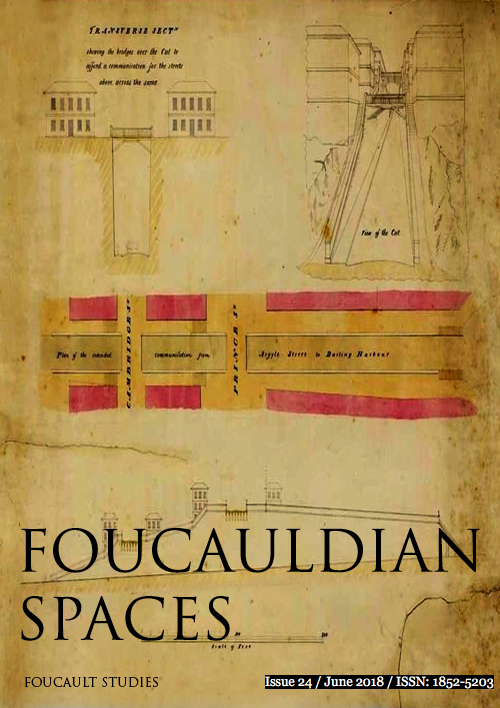Round Table Discussion with Lynne Huffer, Steven Ogden, Paul Patton, and Jana Sawicki
DOI:
https://doi.org/10.22439/fs.v0i24.5527Abstract
Joanna Crosby and Dianna Taylor: The theme of this special section of Foucault Studies, “Foucauldian Spaces,” emerged out of the 2016 meeting of the Foucault Circle, where the four of you were participants. Each of the three individual papers contained in the special section critically deploys and/or reconceptualizes an aspect of Foucault’s work that engages and offers particular insight into the construction, experience, and utilization of space. We’d like to ask the four of you to reflect on what makes a space Foucauldian, and whether or not (and why or why not) you’d consider the space created by the convergence of and intellectual exchanges among an international group of Foucault scholars at the University of New South Wales in the summer of 2016 to be Foucauldian.
References
• Assata Shakur, “Women in Prison: How We Are,” in The New Abolitionists: (Neo) Slave Narratives and the Contemporary Prison Writing, ed. Joy James (Albany: SUNY Press, 2005), 85. For an analysis of Shakur and other black feminists in relation to Foucault, the GIP, and prison abolition see Stephen Dillon, “‘Can They Ever Escape?’ Foucault, Black Feminism, and the Intimacy of Abolition,” in Zurn and Dilts, 259-276.
• Ben Doherty, “Scale of Surveillance in Manus Island Detention Centre Laid Bare,” The Guardian Australia, 19 May 2017.
• Edward S. Casey, The Fate of Place: A Philosophical History, (Oakland: University of California Press, 1998)
• Gilles Deleuze, Foucault, (Minneapolis: University of Minnesota Press, 1988), 50.
• Judith Butler, Bodies that Matter: On the Discursive Limits of “Sex,” (London and New York, Routledge, 1993, 2011)
• Kevin Hetherington, The Badlands of Modernity: Heterotopia and Social Ordering, (New York: Routledge, 1997): https://doi.org/10.4324/9780203428870
• Lynne Huffer, Mad for Foucault: Rethinking the Foundations of Queer Theory (New York: Columbia University Press, 2010)
• Michel Foucault “Politics and Reason,” in Politics, Philosophy, Culture: Interviews and Other Writings 1977-1984, ed. Lawrence D. Kritzman, (New York: Routledge, 1990)
• Michel Foucault, “Des Espace Autres,” Architecture/Mouvement/Continuité, October, 1984: 1-9, trans. Jay Miskowiec
• Michel Foucault, “Different Spaces,” in Essential Works of Foucault 1954–1984, Volume 2: Aesthetics, Method, and Epistemology, trans. Robert Hurley et al., ed. James D. Faubion, (New York: The New Press, 1998)
• Michel Foucault, “Introduction,” in Michel Foucault and Ludwig Binswanger, Dream and Existence, ed. Keith Hoeller, (Atlantic Highlands, N.J.: Humanities Press, 1993)
• Michel Foucault, “Nietzsche, Genealogy, History,” in Essential Works of Foucault, 1954-1984, Volume 2
• Michel Foucault, “Preface,” in Gilles Deleuze and Félix Guattari, Anti-Oedipus: Capitalism and Schizophrenia (Minneapolis: University of Minnesota Press, 1983),
• Michel Foucault, “Questions on geography,” in Power/Knowledge: Selected Interviews and Other Writings, ed., Colin Gordon, (New York: Vintage, 1980)
• Michel Foucault, “Space, Knowledge, and Power,” in Essential Works of Foucault 1954–1984, Volume 3: Power, trans. Robert Hurley et al., ed. James D. Faubion, (New York: The New Press, 2000)
• Michel Foucault, Discipline and Punish: The Birth of the Prison, trans. Alan Sheridan (New York: Vintage, 1979)
• Michel Foucault, History of Madness, trans. Jonathan Murphy and Jean Khalfa (New York: Routledge, 2006)
• Michel Foucault, Security, Territory, Population: Lectures at the Collège de France, 1977-1978, trans. Graham Burchell, (New York: Palgrave Macmillan, 2007)
• Michel Foucault, The Birth of Biopolitics: Lectures at the Collège de France, 1978-1979, trans. Graham Burchell, (New York: Palgrave Macmillan, 2008)
• Michel Foucault, The History of Sexuality: Volume 1, An Introduction, trans. Robert Hurley, (New York: Vintage, 1990)
• Michel Foucault, The History of Sexuality: Volume 2: The Use of Pleasure, trans. Robert Hurley (New York: Vintage, 1990)
• Michel Foucault, The Order of Things: An Archaeology of the Human Sciences (New York: Random House, 1970)
• Michel Foucault, The Punitive Society: Lectures at the Collège de France, 1972-1973, trans. Graham Burchell, (New York: Palgrave Macmillan, 2015)
• Stuart Elden, Mapping the Present: Heidegger, Foucault and the Project of a Spatial History, (New York: Continuum, 2001)
• Wendy Brown, Undoing the Demos: Neoliberalism’s Stealth Revolution (Brooklyn, NY: Zone Books, 2015)
Downloads
Published
How to Cite
Issue
Section
License
Authors retain copyright to their work, but assign the right of the first publication to Foucault Studies. The work is subject to a CC BY-NC-ND 4.0 license, but despite these restrictions, authors can take for granted that Foucault Studies will permit articles published in Foucault Studies to be translated or reprinted in another format such as a book providing a full reference is made to Foucault Studies as the original place of publication.



